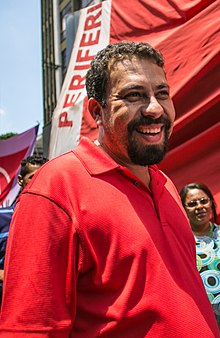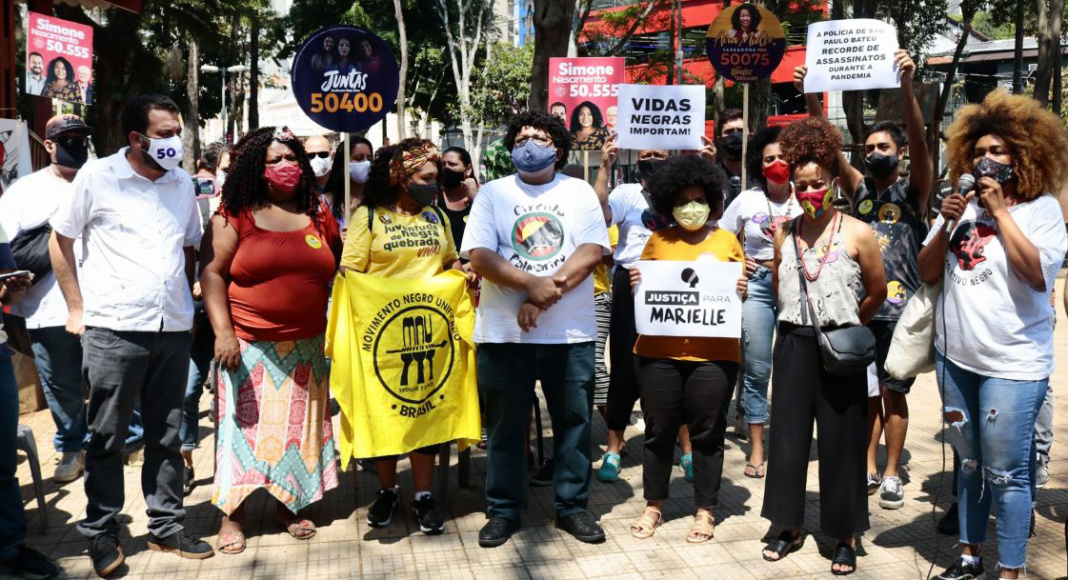December 3 2020. Bolsonaro and his brand of extreme right wing politics have emerged as the big losers in Brazil’s recent local elections, but established left wing parties have not done so well either. Instead, after two years of the politics of hatred, division and denial of the pandemic and the climate crisis, the electorate in over 5,000 municipalities, from big cities to rural areas, voted overwhelmingly for traditional moderates of the centre-right parties.
Bolsonaro, who illegally used the presidential infrastructure to record videos in support of his chosen candidates, seems to have fallen on his face. Almost everyone he openly backed, failed to get elected, including the 66 candidates who went so far as to add the name Bolsonaro to their own, in the hope it would bring them loads of votes. The only Bolsonaro who got himself elected was his son Carlos in Rio, with a reduced number of votes.
But the rejection of Bolsonaro did not benefit the PT. For the first time since 1985, the Workers Party failed to elect the mayor of any of the 27 state capitals.
In Brazil’s largest city, São Paulo, where the party began its rise to power 40 years ago, its candidate, the worthy but uncharismatic Jilmar Tatto, got a miserable 6% in the first round.

Instead left wing and progressive votes went to a rising political star, 40-year-old Guilherme Boulos, standing for the small PSOL, the Socialism and Liberty Party. The PSOL was created in 2015 by dissidents of the PT who opposed President Lula’s proposed pension reform and the party’s pragmatic alliances with right-wing politicians.
Boulos, who has no legislative or executive experience, but led the MTST, a well organised movement of homeless people for many years, ran a shoe string campaign on a positive, anti-hate platform against the incumbent mayor who had ample funding and all the government machinery at his disposal. His command of the social media helped him conquer most of the young and progressive votes, giving him 40% against the centrist PSDB’s Bruno Covas, who got 60% in the second round. And this was in spite of a biased media and contracting Covid-19, days before the final vote.
Boulos said ‘We will continue fighting for a society where nobody has to live on the street, nobody has to search the rubbish to find something to eat. A society where no one is killed because of the colour of his skin, where women have the same rights as men, and where all forms of love are respected’.
The climate of opinion
For analysts, Brazilians voted for those who offered solutions in the areas that most affected them – health, education and jobs. ‘The mood has changed since 2018. These municipal elections are important not because they say who will win the next presidential race in 2022, but because they indicate the humour, the issues, the climate of opinion’, said Fernando Abrucio, a political scientist. He believes the main theme for the 2022 presidential elections will be the social question, a contrast with Bolsonarismo and its emphasis on conservative morality, arming the population, and its denial of social issues such as racism, social inequality and diversity. These differences are also explicit in the overwhelmingly white male government formed by Bolsonaro, and the diversity of the politicians elected by PSOL, almost half of them black, 40% women and several transgender.
Black and women candidates were also elected by several of the other parties, although the numbers are nowhere near their proportion of the population – over 50% in both cases. An unprecedented number of indigenous men and women were also elected as mayors and councillors, mostly in the Amazon states. They ran for a wide range of parties, both left and right. Joenia Wapixana, the first indigenous woman elected to the national congress, says electing indigenous representatives is an act of resistance against the stigmas used against them. ‘We have advanced in protagonism without forgetting our identity and our roots.’
For the PSOL, the elections showed that the party has become a decisive actor in the articulations of the opposition parties to defeat Bolsonaro’s plans to get re-elected in 2022.
Coalitions of leftwing parties came together to elect the mayors in several important cities.
Any such coalition, or ample front, aimed at winning the 2022 election, must include the PT, still by far the biggest left wing party in terms of members, voters, and seats in congress, if it is to have any chance. The local elections have also shown that an alliance of centre right parties, now flexing their muscles after their municipal show of strength, will probably want to field their own candidate, and not endorse Bolsonaro.
Is this the end of the king?
The big question for the PT is, where will this new political chessboard leave King Lula? Has he been checkmated? Will he be happy as a mere bishop, knight or even a pawn in the 2022 game, whose opening moves are already underway?
But although speculation about 2022 has been set in motion, Brazil’s immediate problems and how they are dealt with could call the shots. The coronavirus epidemic is still killing several hundred Brazilians every day, with deaths likely to reach almost 200,000 by the New Year. The Ministry of Health under Bolsonaro’s choice, General Eduardo Pazuello, has become a sea of incompetence, with Brazil’s proven track record in vaccination campaigns sabotaged and discredited.
Then millions of unemployed men and women who obtained temporary relief through the emergency aid programme, have been told effectively, ‘That’s it! Now you’re on you own!’ –although the jobless number stands at a record high of 14 million. ‘Work is ennobling’ is Bolsonaro’s only contribution, whether offered sarcastically or not no one knows. He is probably in denial about the real situation of employment, as he remains about the defeat of his idol, Donald Trump, in the US elections. Brazil is one of a tiny minority of countries which still has not recognised Joe Biden as president elect. And his latest advice on the pandemic is against the wearing of masks.
So the other big question for 2021 is: will the efforts to remove him from office by impeachment on charges of the criminal irresponsibility which has contributed to thousands of deaths in the pandemic be successful? Will the ‘Centrão’, the centre right parties which have done so well in the local elections continue to support him, or will they find their own candidate for 2022 and abandon him?
Main image: Guilherme Boulo (PSOL) candidate for Mayor of São Paulo in an important discussion with leaders of the Movimento Negro and candidates for councillor, 13 October 2020. Photo: Fotos públicas/Twitter

